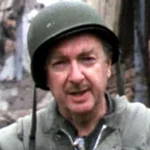 |
| Walter Cronkite |
The news announcing the death of Henry Kissinger, the last of the prevaricating politicians and so-called statesmen who stole my future and that of thousands of other young Americans, got me thinking about Walter Cronkite.
Cronkite may be the only journalist who ever ended a war single-handedly, although he had plenty of help from his colleagues doing the dirty work of reporting about Vietnam for many years.
Following the Tet Offensive in 1968, Cronkite went to Vietnam and tromped around the country for several days, interviewing military commanders and talking to people just as he had done as a UPI correspondent in Europe during WWII.
“He was just doing the gumshoe reporting all over Vietnam, and the print reporters all swooned over Cronkite for doing it,” historian and Cronkite biographer Douglas Brinkley told Joel Achenbach of the Washington Post in 2018, fifty years after what came to be called, “The Cronkite Moment.”
The moment came when Cronkite went on the air in an hour-long CBS News special on Feb. 27, at 10 p.m. Eastern time, titled, “Report from Vietnam: Who, What, When, Where, Why?”
The report detailed how we were failing in Vietnam after three years of fierce fighting, plus millions of pounds of bombs, and ended with this defining moment:
“[I]t seems now more certain than ever that the bloody experience of Vietnam is to end in a stalemate . . . [I]t is increasingly clear to this reporter that the only rational way out then will be to negotiate, not as victors, but as an honorable people who lived up to their pledge to defend democracy, and did the best they could.
President Johnson was deflated by Cronkite’s report, saying, “If I’ve lost Cronkite, I’ve lost Middle America.”
Lyndon Johnson called CBS president Frank Stanton the day after the broadcast, wrote Achenbach, citing a book written by CBS correspondent Morley Safer.
“Hello, Frank, this is your president,” Johnson said.
“Yes, Mr. President.”
“Frank, are you trying to f$!k me?”
Up until that time, Cronkite had never publicly voiced an opinion about the war. “But something did pivot when Cronkite crossed the line into opinion. Cronkite mainstreamed antiwar sentiment,” Achenbach wrote.
Cronkite’s report finished Johnson, but it did not finish the war, which dragged on for five more years while Nixon and Kissinger practiced their Machiavellian form of statesmanship. “Peace is at hand,” they proclaimed on October 26, 1972.
Meanwhile, more Americans perished in jungles and rice paddies. We mourn them all, and this country will not heal until the last of our generation is gone.
RIP Dr. Kissinger. Your place in history is secure: War criminal.
***
Bill Huey is president of Strategic Communications and the author of Advertising's Double Helix: A Proposed New Process Model. Journal of Advertising Research, May/June 1999. His article about advertising effects has been cited in books and academic papers around the world.


 The ridiculously high prices Americans are paying at the supermarket might influence how—or if—they vote in November.
The ridiculously high prices Americans are paying at the supermarket might influence how—or if—they vote in November. At a moment in history when there are so many conflicts among peoples here and abroad, let us put our differences aside and celebrate this wonderful season in a spirit of togetherness.
At a moment in history when there are so many conflicts among peoples here and abroad, let us put our differences aside and celebrate this wonderful season in a spirit of togetherness. To win next November, Team Biden must get out of its comfort zone and begin to think of creative ways to attract voters in those swing states.
To win next November, Team Biden must get out of its comfort zone and begin to think of creative ways to attract voters in those swing states.


 Have a comment? Send it to
Have a comment? Send it to 
No comments have been submitted for this story yet.